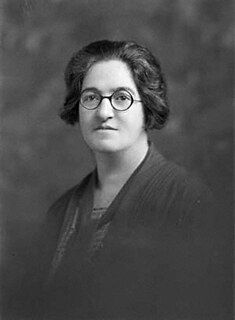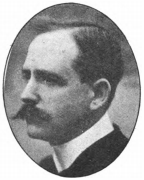
Margaret Grace Bondfield was a British Labour Party politician, trade unionist and women's rights activist. She became the first female cabinet minister, and the first woman to be a privy counsellor in the UK, when she was appointed Minister of Labour in the Labour government of 1929–31. She had earlier become the first woman to chair the General Council of the Trades Union Congress (TUC).

Marion Phillips was a Labour Party politician and Member of Parliament in England.
The Women's Peace Council was a group that, during World War I, campaigned for a negotiated end to the conflict. The group's membership was mainly from the Women's Freedom League, a group made up of suffragettes. Many of its members were also pacifists. The Women's Peace Council was founded in 1915 because the leaders of the Women's Freedom League believed that the British government's anti-war efforts were insufficient in ending conflict during World War I and they wanted to bring about negotiated peace. The newly formed Women's Peace Council is a rebirth of the Women's Peace Council from World War I, but it is now a global organization dedicated to peace and well-being, led by women. Their Facebook page describes the purpose of the group as follows: "The Women’s Peace Council will bring together people from different backgrounds to imagine a world without fear and hatred." The co-founders of the newly formed Council are Tezikiah Gabriel, Jayne Hillman, and Deborah Greene. The Charter Members include Dimah Mahmoud, Rosa Davis, Kath Knight, Tracy Chapman, and Jennifer Carolyn King.

Mary Agnes Hamilton was a writer, journalist, broadcaster, civil servant, and the Labour Member of Parliament for Blackburn from 1929 to 1931.

Thomas Williams, Baron Williams of Barnburgh, PC was a British coal miner who became a Labour Party politician.

William Henry Andrews, commonly known as Bill Andrews, was the first chairman of the South African Labour Party (SALP) and the first General Secretary of the Communist Party of South Africa. He was also active in the formation of the Industrial and Commercial Workers' Union.

James Andrew Seddon CH was a British trades unionist and politician. Originally a member of the Labour Party, he subsequently moved to the National Democratic and Labour Party.

Mary Reid Anderson was a Scottish suffragist and was a leading trades unionist. She was the general secretary of the Women's Trade Union League and was involved in the formation of the National Federation of Women Workers and National Anti-Sweating League. In 1910, Macarthur led the women chain makers of Cradley Heath to victory in their fight for a minimum wage and led a strike to force employers to implement the rise. About 1901, Macarthur became a trade unionist after hearing a speech made by John Turner about how badly some workers were being treated by their employers. Mary became secretary of the Ayr branch of the Shop Assistants' Union, and her interest in this union led to her work for the improvement of women's labour conditions. In 1902 Mary became friends with Margaret Bondfield who encouraged her to attend the union's national conference where Macarthur became the first woman to be elected to the union's national executive.

The representation of women in the House of Commons of the United Kingdom has been an issue in the politics of the United Kingdom at numerous points in the 20th and 21st centuries. Originally debate centred on whether women should be allowed to vote and stand for election as Members of Parliament. The Parliament Act 1918 gave women over 21 the right to stand for election as a Member of Parliament. The United Kingdom has had two female Prime Ministers: Margaret Thatcher (1979–1990) and Theresa May (2016–2019). The publication of the book Women in the House by Elizabeth Vallance in 1979 highlighted the under-representation of women in Parliament. In more modern times concerns about the under-representation of women led the Labour Party to introduce and, decades later, abandon all-women short lists, something which was later held to breach discrimination laws.
The Northampton by-election was a parliamentary by-election held for the British House of Commons constituency of Northampton on 1 April 1920.
Dame Beatrice Annie Godwin DBE, known as Anne Godwin, was a British trade unionist.
The National Union of General Workers (NUGW) was an early general union in the United Kingdom, the most important general union of its era.
Herbert Henry Elvin was a British trade unionist.
John Thomas Macpherson (1872–1921) was a Labour Member of Parliament for the United Kingdom House of Commons constituency of Preston.
The Women's Labour League (WLL) was a pressure organisation, founded in London in 1906, to promote the political representation of women in parliament and local bodies. The idea was first suggested by Mary Macpherson, a linguist and journalist who had connections with the Amalgamated Society of Railway Servants, and was taken up by several notable socialist women, including Margaret MacDonald, Marion Phillips and Margaret Bondfield. The League's inaugural conference was held in Leicester, with representatives of branches in London, Leicester, Preston and Hull. It was affiliated to the Labour Party. Margaret MacDonald acted as the League's president, while both Margaret Bondfield and Marion Phillips served at times as its organising secretary.
Thomas Summerbell was an early British Labour Party Member of Parliament.
Margaret Hardinge Irwin CBE was a suffragist, and Scottish labour activist who held important posts in the trade union movement.

The Friendly Society of Iron Founders of England, Ireland and Wales (FSIF) was an early trade union representing foundry workers in the United Kingdom.
The National Amalgamated Union of Shop Assistants, Warehousemen and Clerks was a trade union representing retail workers in the United Kingdom.
William Johnson was a British trade unionist and socialist activist.









